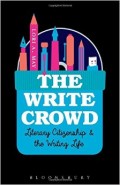
Book Review: The Write Crowd: Literary Citizenship and the Writing Life by Lori A. May
The Write Crowd: Literary Citizenship and the Writing Life
Lori A. May
Bloomsbury, December 2014
ISBN-13: 978-1628923094
$19.95; 194pp.
Reviewed by Maggie Trapp
In order to shore up the pit of procrastination, counter the false allure of busywork, and rebuff all manner of small and large seemingly important distractions, writers often tell themselves that if they want to write, they simply need to sit down and write. Haven’t we all felt, as we decide to sit and write, the sudden and urgent need to dust the bookshelves, check the laundry, email the students, wash the dishes, and plan the next week’s worth of to-do–list items? Considering the fact that regularly sitting down to write for extended periods is hard work for many writers, one wonders what Lori May means by writing a book that’s all about the things writers should do that are not sitting down to write.
In her newest book, The Write Crowd: Literary Citizenship and the Writing Life, May, who also wrote The Low-Residency MFA Handbook: A Guide for Prospective Creative Writing Students, makes the case that writers would do well to become part of a larger writing community. May argues that writers need to do more than sit down alone and confront the blank page or screen. Rather than considering their craft to be solely a solitary endeavor, writers, according to May, should think of themselves as literary citizens. And as good citizens in the literary world, it is their duty to reach out and connect with other writers, literary organizations, students, and publishing venues: “Literary citizenship takes the power of the individual and puts it to use in fostering, sustaining, and engaging with the literary community for the benefit of others….It doesn’t matter how much time or money you can offer to the community. What matters most is that you find authentic ways to connect and contribute.” May claims that becoming an active literary citizen will only serve to further your own writing goals; your involvement in this larger community of writers, readers, and publishers will allow you to touch many, which is always a good thing. As she notes, “Writing may be a solitary act, but there is no greater thrill than feeling like our words, thoughts, and efforts matter outside of our own selves.”
But where to start? Even if a writer can be convinced of the value of becoming involved in a larger writing life, it may be less clear what the first steps toward this life would look like. This is where The Write Crowd—part primer, part self-help manual, part resource guide—comes in. May writes convincingly of why it matters that writers reach out and get involved in a literary life more expansive than their own desks, and she follows up her enthusiastic nudges with a welter of practical advice and concrete ideas for ways to make the most of both one’s skills as well as the writing community one might join. May suggests everything from writing book reviews to regularly attending local readings, from volunteering in schools to reading the slush pile at a small press.
What makes this book so useful is that May follows up her ideas with both practical examples (her book includes appendices of book review samples as well as lists of writing-focused community organizations) and real-world advice from full-fledged literary citizens who are already out there making a difference. This is a book that is meant to serve as a guide. It’s incredibly hands-on. To that end, May interleaves quotes from insiders throughout her own assertions. Much of what she advises and prompts writers to do is backed up with helpful quotes from editors, reviewers, publisher, publicists, and working writers. As we read, we get to hear firsthand how the literary world works for many in the trenches. This direct access to insiders’ advice makes May’s how-to manual both vivid and relevant.
It’s true that doing anything other than writing can feel like a distraction from the “real” (and really hard) work of arranging words into sentences and paragraphs, but, as May makes clear, purposely putting yourself out there and giving of yourself to the larger literary citizenry, at least some of the time, can only enrich all that other, more solitary work. And it’s much more fulfilling than dusting bookshelves.
Maggie Trapp teaches literature and writing online for UC Berkeley Extension, and she publishes book reviews for various publications.

